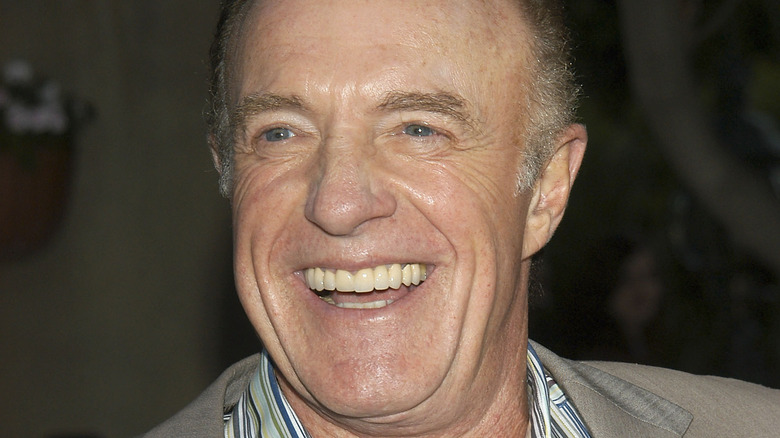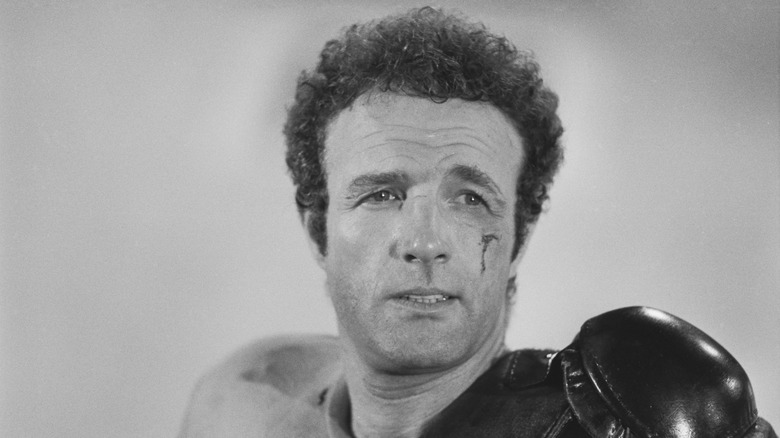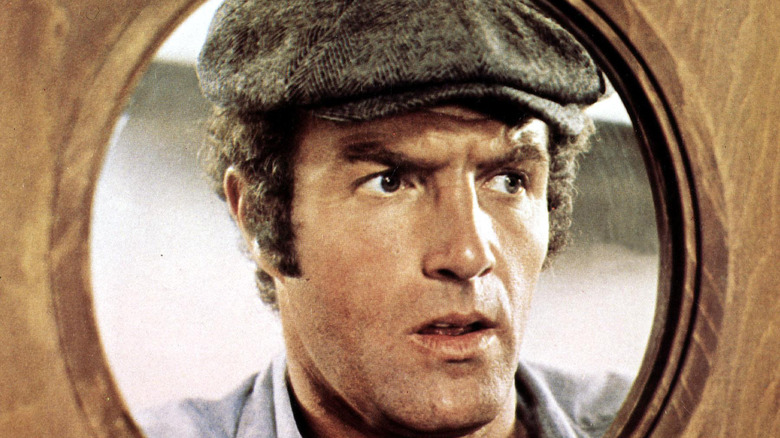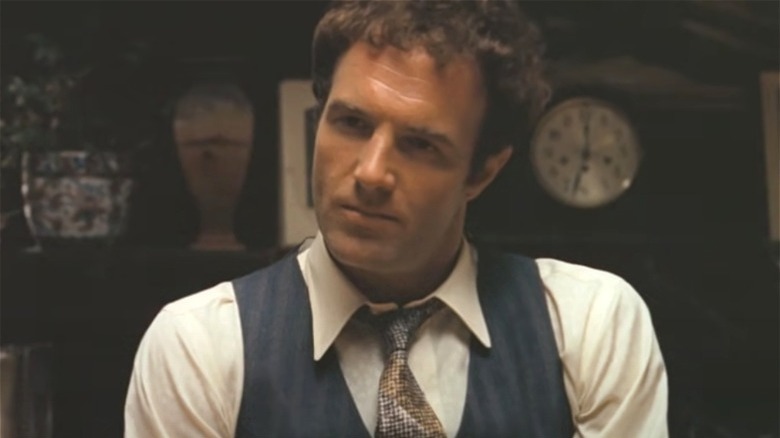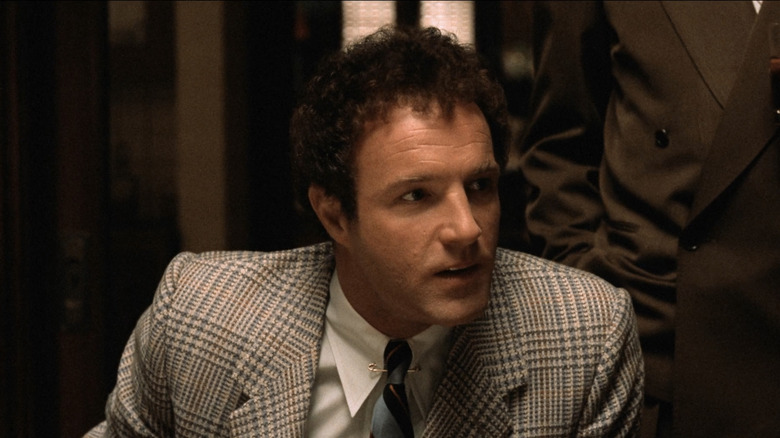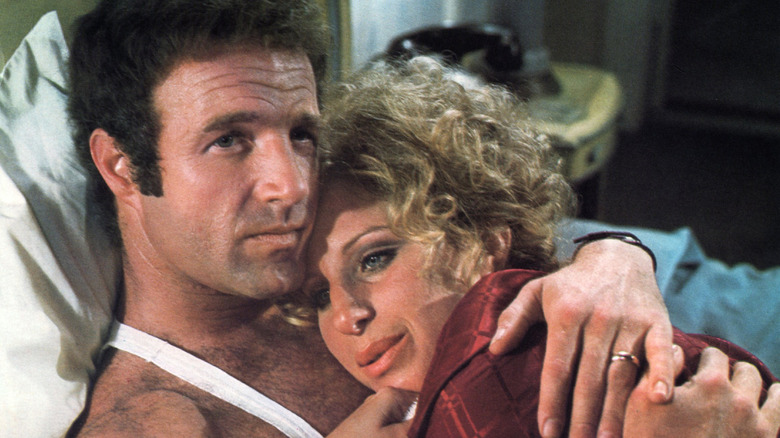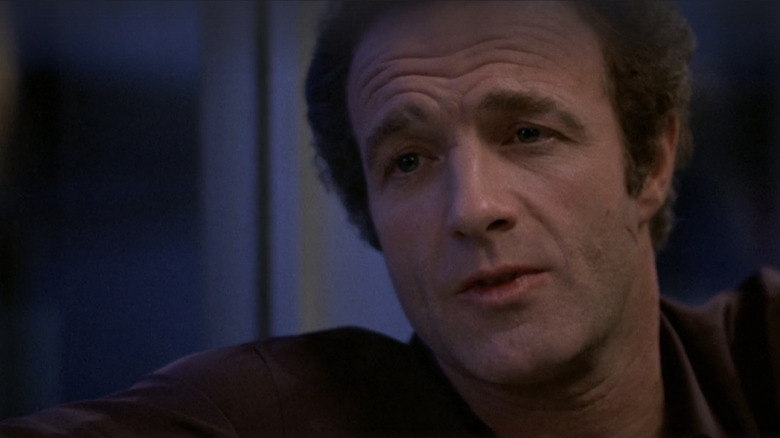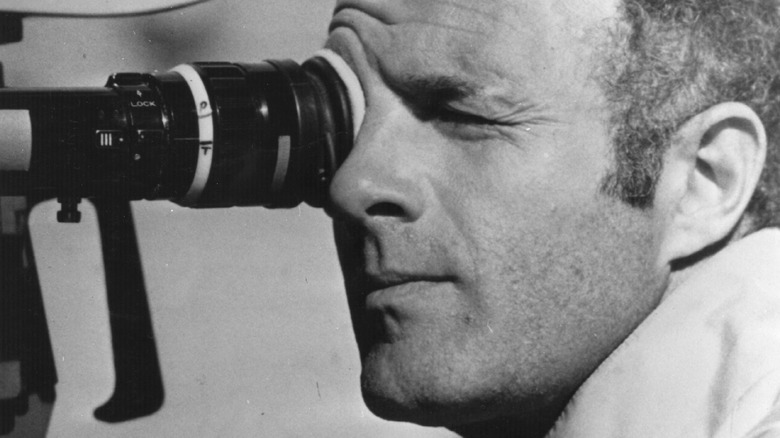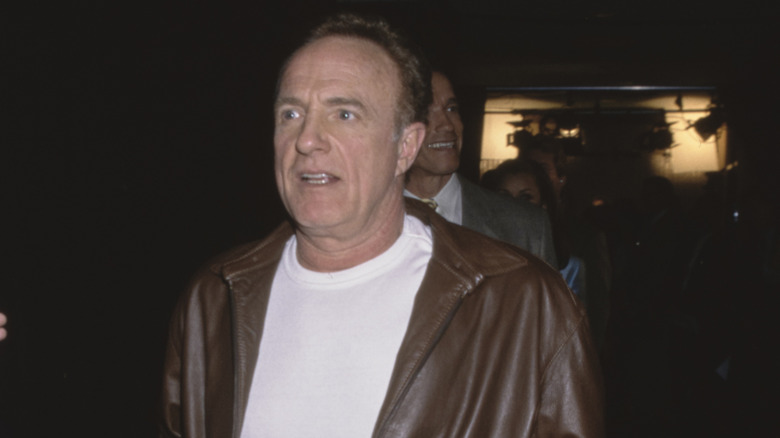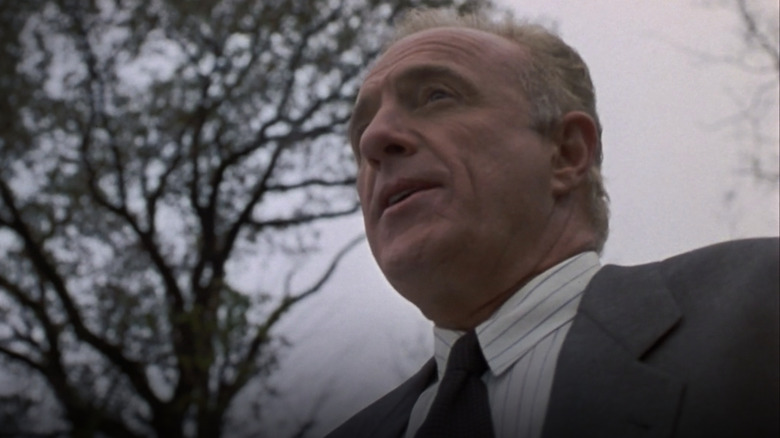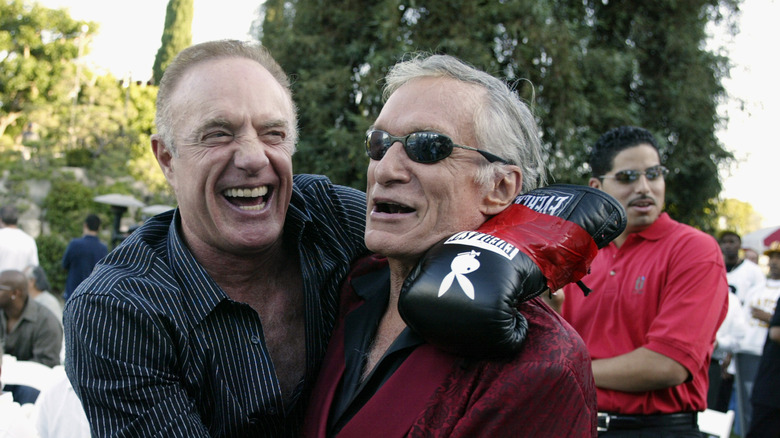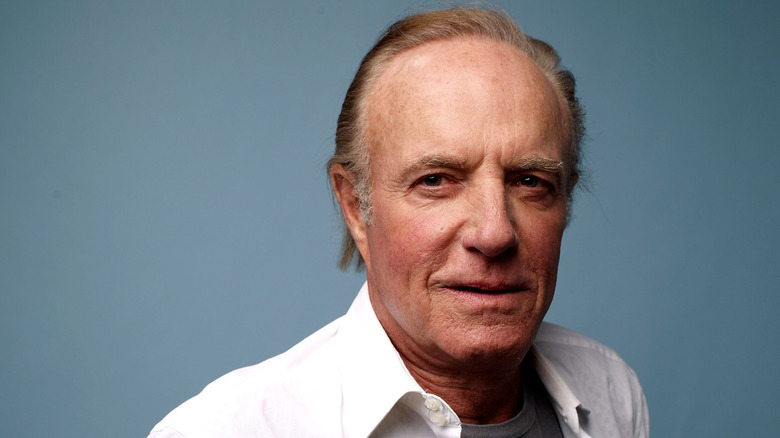The Untold Truth Of James Caan
We may receive a commission on purchases made from links.
On July 6, 2022, the film world was stunned by the death of actor and filmmaker James Caan. A character actor with movie star swagger, or perhaps the other way around, Caan got his start on television in the 1960s before becoming one of the biggest names in Hollywood in the 1970s, thanks in large part to his immortal turn as Sonny Corleone in "The Godfather." Though his career had its ups and downs over the years, Caan remained an indelible presence on screen, bringing authenticity and gravitas to everything from a Danish provocation to a 21st century Christmas classic.
Even offscreen, his life was the stuff of legend: An athlete turned actor turned Little League coach turned actor again; a fixture at the Playboy mansion; a movie mobster who all too often was mistaken for the real thing; and an unlikely star on Twitter. Above all, as seen in the many tributes that have been published since his death, he was a generous artist and professional whose work continues to inspire. Let's take a look at some things you might not know about James Caan.
He was an athlete first
Growing up on the mean streets of Sunnyside, Queens, in the 1950s, Caan made a name for himself — two names, in fact — with his physical prowess. He earned one nickname, Shoulders, due to his broad physique. "I had these little skinny legs...[with] this big square top," Caan told Cigar Aficionado in a 2006 interview. The second nickname, Killer Caan, came from his skills as a teenage boxer. "You know, we boxed in a ring...sometimes it wasn't in a ring."
At age 16 he moved halfway across the country to attend Michigan State University, where he studied Economics and played football. Years later, Caan would downplay his contributions to the team, joking that his job was "mostly holding bags and being the tackling dummy," but that experience of being a football player and an athlete in general would mark a number of his most famous roles, from real-life Chicago Bear Brian Piccolo in the 1971 docudrama "Brian's Song" to the star player of a dystopian bloodsport in Norman Jewison's "Rollerball." Even when playing a bedridden romance novelist in "Misery," Rob Reiner's 1990 Stephen King adaptation, Caan's physicality plays an important part. As screenwriter William Goldman wrote in his 2000 memoir, "That pent-up energy you saw on screen was very real. And it was one of the main reasons, at least for me, the movie worked."
The acting bug bit when he was in college
After just a year at Michigan State, James Caan returned to New York City and enrolled at Hofstra University on Long Island. As per Cigar Aficionado, the early morning before his classes he would pull a shift at a meatpacking plant. Caan was not afraid to study or to work hard, but it was clear early on that neither the life of an academic or a meatpacker was for him. His next move: Manhattan's the Neighborhood Playhouse. Caan studied and performed at the acting school for five years, working closely with famed acting teacher Sanford Meisner, whose technique revolved reaction rather than calculated performance. Many well-known actors have trained at the Neighborhood Playhouse over the years, including Caan's "Godfather" co-star Robert Duvall and "Elf" co-star Mary Steenburgen.
Caan's earliest on-screen roles were in television, where he notched appearances on anthology series like "Route 66" and "Naked City." A handful of small film roles followed, and Caan finally got his breakthrough in 1966's "El Dorado," Howard Hawks and John Wayne's unofficial remake of their own "Rio Bravo." Three years later luck would strike again when Caan's old Hofstra classmate Francis Ford Coppola cast him as a former football player in the road trip drama "The Rain People" opposite Shirley Knight and Robert Duvall.
Real life wiseguys
As Francis Ford Coppola, Robert Duvall, and James Caan were working on "The Rain People," author Mario Puzo released his bestselling crime novel "The Godfather," a multi-generational look at America through the changing fortunes of a mafia leader and his children. The story of how this pulpy, gossipy, and occasionally offensive book was turned into one of the greatest films of all time has been written and told time and again, most recently in the Paramount Plus miniseries "The Offer."
Paramount Pictures hired Coppola to adapt and direct the film, feeling that having an Italian-American at the helm would ensure that the film was authentic, and would protect them against charges of racism. Coppola had to fight the studio over everything, including the casting of Caan and newcomer Al Pacino as mob sons Sonny and Michael Corleone. Caan embraced his role as the hotheaded Sonny, turning to his friend, insult comic extraordinaire Don Rickles, for inspiration. "The Godfather" has long been dogged with questions of how much of the story is based on true events, and how much the real-life mafia was involved with the film's production. We may never be able to fully separate the truth from the legends, but we do know that at some point during the production of the film Caan became good friends with Colombo crime family lieutenant Andrew Russo. Per the New York Post, their relationship was so strong that when Russo was arrested in 2011, the "Rollerball" actor submitted a letter to the court vouching for him.
Forever Sonny
Playing Sonny Corleone in "The Godfather" earned James Caan a Golden Globe nomination and his sole Academy Award nod; he might have won if the Academy had not pitted him against co-stars Robert Duvall and Al Pacino in the Best Supporting Actor category. Instead, Joel Grey took home the award for "Cabaret." The film was an immediate critical and commercial smash, the highest grossing film of 1972, and introduced a whole new pop culture lexicon. In addition to famous lines like "Leave the gun, take the cannoli," the film (and book) gave new meaning to the word "godfather," a title that did not have sinister connotations before the novel. Caan made his own indelible contribution to the English language by accident when he improvised the onomatopoeia "bada bing!" to represent a bullet to the head.
Many actors become associated with one particular role, and this was certainly true for Caan, especially in his later years; many of his roles in the 1990s and 2000s like "Mickey Blue Eyes" and "The Way of the Gun" played on the audience's familiarity with Sonny Corleone. But the role also followed him around in a more unusual way: Caan, who was of Hungarian Jewish descent, was often mistaken for Italian, if not an actual wiseguy. "I won Italian of the Year in New York twice," he told Vanity Fair in 2009, and was once even denied a country club membership on grounds that he was a mafioso.
The roles not taken
James Caan was a bona fide A-lister in the 1970s, but in the years following "The Godfather" he took a more eclectic route with his stardom, acting in films like Sam Peckinpah's ninjas-vs-spies mash-up "The Killer Elite" and the turn-of-the-century caper "Harry and Walter Go to New York." He wasn't afraid to play against his tough guy image, either, in sensitive supporting turns opposite Barbra Streisand and Jane Fonda in "Funny Lady" and "Comes a Horseman," respectively.
Few of these films were blockbuster hits, certainly not on the level of "The Godfather," but it wasn't as if he was losing out on big roles — in fact, more often than not he was turning them down. "If there's anything I can attribute my success to," Caan told Roger Ebert in 1988, "it's that I said 'no.'" Perhaps, though, he was saying no a bit too often when he turned down the lead roles in "One Flew Over the Cuckoo's Nest," "Kramer vs. Kramer," "Superman," and "Apocalypse Now" for one reason or another. As he said to WENN, he didn't want to be upstaged by a child actor in a sentimental weepie like "Kramer," while the thought of spending months in the jungle was enough to deter him from reuniting with Coppola on "Apocalypse Now."
He played a big part in Michael Mann's debut
"The Godfather" would sit at the top of nearly any actor's resume, and rightly so, but James Caan had other, less heralded favorites. First among those was "Thief," the 1981 debut feature of writer-director Michael Mann, who would go on to revolutionize the crime drama on television and film with "Miami Vice," "Manhunter," and "Heat," among many others. In a 2013 interview with the AV Club, Caan took credit for discovering Mann, recounting how the fledgling filmmaker waited to talk to him on the set of the Neil Simon adaptation "Chapter Two." Caan went along with it, checked out with Mann wrote, and recognized something good was brewing. "I was very fortunate that I was able to do whatever the hell I wanted to do, so I put it together right away," he said. And with that, "Thief" was underway.
With all due respect to Sonny Corleone, "Thief" is arguably Caan's finest performance. Based on the supposed true account of a former safecracker, Caan plays Frank, a stoic, principled thief (cash and diamonds only) who dreams of a straight life and a family with his girlfriend (Tuesday Weld). Frank is a hard-talking tough guy, pressed into one last job by a dangerous mobster (Robert Prosky), but Mann and Caan give him vast reserves of pain and trauma just under the surface. As a storyteller, Mann's aesthetic of crooks and cops driving rain-soaked urban streets, pulsing to the beat of dreamy synths (courtesy of Tangerine Dream here) is already fully formed and on display.
A years-long hiatus
But even an artistic success like "Thief" can't nourish an actor forever, and at a certain point in the early 1980s, James Caan stepped away from the film business, seemingly for good. There were several contributing factors, starting with a bad experience filming the 1982 romantic comedy "Kiss Me Goodbye," co-starring Sally Field and Jeff Bridges. During this time Caan's sister Barbara died of leukemia. He told Cigar Aficionado that following her death, his personal life took a turn for the worse. A car accident in 1985 sidelined him further, and soon it had been a full five years since he'd appeared in a movie.
Much of that time was spent coaching Little League baseball, an experience Caan cherished. As he said in Cigar Aficionado, "I love kids because they're not full of s***, you know?" But coaching Little League doesn't pay the bills, and due to some financial chicanery on the part of his accountant, Caan's financial situation took a significant hit. Reluctantly he returned to the movies in 1987, reuniting with Coppola for the first time in 13 years for the drama "Gardens of Stone" and starring in the 1988 sci-fi buddy cop feature "Alien Nation."
James Caan's trouble with the law
By the mid-1990s, James Caan was back on top, thanks to a string of hits and notable films like "Misery" and the 1992 romantic comedy "Honeymoon in Vegas." But professional success and personal success don't always go hand in hand, and during this time Caan was the subject of two bizarre police investigations. In 1993, a man named Mark Schwartz died when trying to climb up to the balcony of an apartment where the actor was staying. An acquaintance of Caan, Schwartz fell while attempting to reach the unit. Caan was asleep when this happened, and though the police initially questioned him as a person of interest, he was eventually cleared of all suspicion.
Less cut and dried, however, was an altercation just a few months later when Caan allegedly pulled a gun on a man during an argument. In March 1994, Caan was visiting his brother in Los Angeles when he got into a heated argument with another man, reportedly over an act of vandalism. Hip hop artist Derek Lee, who went by the stage name Doc Rapper, intervened, at which point, according to Lee, Caan pointed a pistol at Lee. Lee called the police and Caan was arrested on a misdemeanor charge, then released later that night. Caan would have faced up to six months in jail, but it appears that the charges against him were eventually dropped.
Bottle Rocket's liftoff
Those legal run-ins did little to slow James Caan's career momentum, as he settled into serving as an elder statesman for a new generation of actors and audiences who grew up watching him in his 1970s heyday. One member of that new generation was a young, unknown Texas filmmaker named Wes Anderson who, along with brothers Luke and Owen Wilson, was preparing his first feature, a low-budget crime comedy called "Bottle Rocket." In 2013 Caan told the AV Club that he did the film as a favor to its executive producer, James L. Brooks. "He said, 'These kids down in Texas, they're doing this film. Would you go down there and do two, three days for me?'"
As Mr. Henry, a charming con-man sought out by Dignan, the unflappably optimistic would-be criminal played by Owen Wilson, Caan got the rare opportunity to do an outright comedy, and to show off his skills at karate, which he studied for decades. His "two, three days" of work helped bring attention to the movie and its makers, launching Anderson and the Wilson brothers to stardom in just a few years. In the late 1990s and early 2000s Caan would act as a kind of good luck charm to other young directors, appearing in Christopher McQuarrie's debut "The Way of the Gun" and James Gray's sophomore effort "The Yards," both in 2000.
He racked up another hit with Elf
Fans of a certain age will no doubt know James Caan best from "The Godfather," but their children and grandchildren might have a different experience of the actor — not as a violent mid-century mobster but as a grumpy dad who needs to learn the true meaning of Christmas. Jon Favreau's 2003 family comedy hit "Elf" has something for everyone, a warmhearted holiday story wrapped in a hip, retro vibe and starring a murderer's row of indie and alt comedy stars, including Zooey Deschanel, Kyle Gass, Andy Richter, a pre-"Game of Thrones" Peter Dinklage, and Amy Sedaris. At the center of the film is Will Ferrell as Buddy the Elf, a human raised at the North Pole, and Caan as his long-lost father Walter.
One of the film's sharpest moves is to keep Walter constantly frustrated by Buddy's antics, even as everyone else is eventually worn down by the man-elf's manic enthusiasm. Even at the end, when father and son have reconciled in time to save Christmas, there's the sense that Walter still isn't a big fan of Buddy's whole thing. Behind the scenes, Caan and his character were not too far apart, as Ferrell once noted on a 2018 episode of "The Late Late Show with James Corden." At the film's premiere, Caan approached Ferrell and said, "Every day on set, I thought you were way too over the top. But now I see what you were doing. Great job."
A lifelong playboy
James Caan counted a lot of Hollywood celebrities as close friends, including Don Rickles and Playboy magazine founder Hugh Hefner. When Caan was going through a difficult divorce from wife Sheila Ryan in 1976, Hefner offered him a place to stay until he got back on his feet. "I got a prescription to live at the Playboy Mansion," he joked to Esquire magazine in 2003. Caan really did live at Hef's house for a short time, and even after moving out remained a frequent guest of the mansion for decades. He even popped up briefly in a 2005 episode of the E! reality series "The Girls Next Door," attending the mansion's annual Halloween party.
As at home as Caan felt at the Playboy Mansion, he seems to have felt just as welcome in the magazine's pages. He was a famously tricky interview subject, by turns hostile to journalists and refreshingly forthright. After his death, many admirers took to social media to post excerpts of his infamous 1976 Playboy interview, during which he spent the whole time goofing on his interviewer and the entire concept of a celebrity profile. In the interview, Caan joked that he only agreed to the one-on-one because Hefner threatened to revoke his mansion privileges, and when asked what drugs he enjoys, he replied, "I take an aspirin now and then, when I've got someone like you to talk to."
The saga of Barry Minkow
After his time in the proverbial desert in the 1980s, James Caan never stopped working, and in fact had several projects in the works that will now be released posthumously. That work ethic, whether due to artistic passion or financial need, resulted in a very busy 21st century for the actor. One such project included the 2018 biopic/federal crime "Con Man."
Based on the life of 1980s Ponzi schemer turned Evangelical minister Barry Minkow, the film went into production in 2009 with Minkow producing and even playing himself. The film had a respectable cast, including Ving Rhames, Mark Hamill, Talia Shire, and Caan as the FBI agent who brings young Minkow's house of cards tumbling down. As writer Jonathan Meyers recounted in Fortune, one day during filming, Minkow, perhaps giddy from being in the same room as Sonny Corleone, confessed to Caan that the film had been financed with stolen money. Recording of Minkow's confession proved integral to a separate investigation, and in 2011 he was convicted of insider trading. The completed film, titled "Minkow" at the time, premiered at the Berlin Film Festival that same year but ended up on the shelf until nearly a decade later, when it was released quietly under the name "Con Man." Even when James Caan wasn't looking for trouble, trouble seemed to find him.
